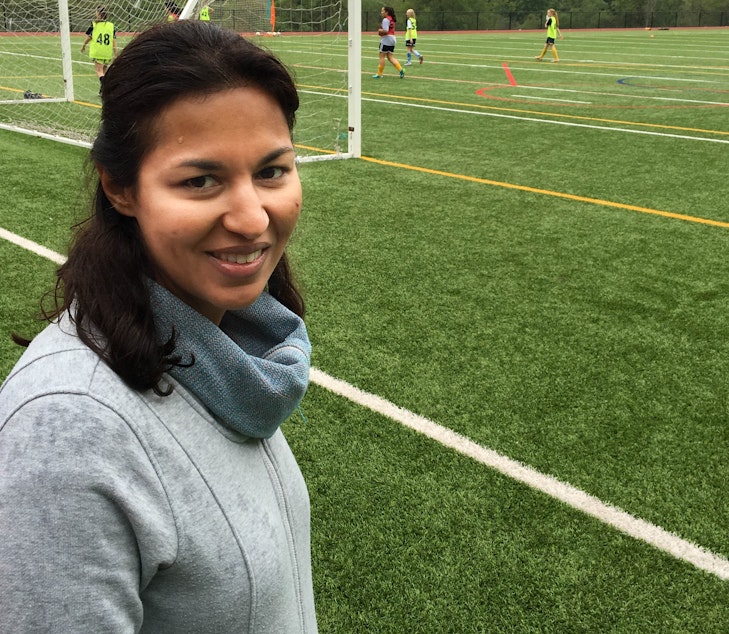All-powerful soccer moms are back for 2016 elections

Back in 1996, the Soccer Mom was seen as a key swing vote. Charlie Rose, the TV host, got into it on PBS.
Rose: "This year pollsters and strategists think the working, suburban mother of school-age children is on the fence. How will the Soccer Moms vote and what do they expect from their candidate?"
Twenty years later, the gender gap looks like the big political story once again. Soccer is as popular as ever with kids. And Soccer Moms are back as a political force in Washington state.
Outside the Pop Keeney Stadium in Bothell, about a dozen kids have showed up to play soccer. There are dads and moms here, too. Soccer moms. Wait, do women call themselves soccer moms in 2016?
One of the parents, Wen Hay, said sure: "Not in a political sense, but soccer moms, yes, because I am one."
Sponsored
A couple decades ago soccer mom was frequently used as a political term. Susan B. Casey is reportedly the first politician to caller herself one. She ran for the Denver City Council in 1995.
Casey: "Soccer mom for city council was the first brochure. And then I finished with soccer mom with a PhD."
"Soccer mom" sent the message to voters that Casey was just like everyone else.
In the 1996 election between President Bill Clinton and Senator Bob Dole, pollsters and campaigns zeroed in on soccer moms as swing voters. Historian Nicole Hemmer defined them as "middle-class, white, with young children, a little harried, a little stressed for time."
But why SOCCER moms? Pollster John Zogby says it was the first time kids played more soccer than baseball or football. And pollsters weren't sure how the moms – these soccer moms – were going to vote.
Sponsored
Zogby: "For a time, they were fiscal conservatives and social liberals – would they vote for Bill Clinton?"
Yes, they would. The gender gap was profound in 1996. Nearly 60 percent of women voted for Bill Clinton here in Washington state. But in 2016, are soccer moms still swing voters?
Back in Bothell, Kim Millikin knows who she DOESN'T want to win the presidential race.
Millikin: "Uhhh, I don't know who I might be interested in voting for, but I'm definitely not voting for Trump."
Hyde: "What has he said in particular that didn't resonate with you?"
Sponsored
Millikin: "Oh many things. I don't need to elaborate. There's just lots crazy out there right now."
Consultant Cathy Allen says that's what she's hearing too. She's a Seattle Democratic who runs focus groups with women here in Washington state.
Allen said that one woman told her, "Donald Trump to me is the net sum of every man I've ever known that's actually done stuff to screw me up."
And there's another problem for Donald Trump.
Historian Nicole Hemmer: "The soccer mom used to be this white middle-class woman in 1996. These days the soccer mom is much more likely to be Latino; she might be African-American; she might be Asian-American."
Sponsored
At another soccer field, this one at the International School in Bellevue, Fauzia Karmali stands on the sidelines with other parents. She moved here from Vancouver, Canada, a number of years ago. Now she's a U.S. citizen.
Karmali: "I will not vote for Donald Trump. Just being a minority and having heard the comments he's made about minorities – it's a complete turnoff for me."
Maybe when it comes to Donald Trump, soccer moms aren't the swing voters of yore. But Allen says the soccer mom as a swing voter is back in Washington State. She believes soccer moms will make a difference on two state initiatives that are likely to be on your fall ballot.
Initiative 1433 would raise the state minimum wage. And Sound Transit 3, the light-rail and bus-expansion plan.
Allen: "Which is one of the largest bills we've ever been asked to pay women are inclined to be voting for. Our soccer moms are definitely very compassionate."
Sponsored
Christine Coyne, a Bellevue soccer mom, is less than enthusiastic about more Sound Transit 3.
Coyne: "I think it's a great idea; I'm just not sure if it's money well spent right here, right now. I'm just not sure it'll be used as much as it could be. I don't think it'll be as popular as they want it to be."
But Stacey Lenderman thinks it'll make life easier for soccer moms like her:
"Expand it, that's fine; if I can drive less, that's good. I've got 10 kids in my car that need to get somewhere fast. If we can make that easier, it's all good."
The draft for the Sound Transit 3 initiative has a $50 billion price tag. And it's likely that it will be on the November ballot.
By the way, the first Sound Transit ballot measure? It passed back in 1996 – the same year the soccer mom became a recognized force in American politics.

